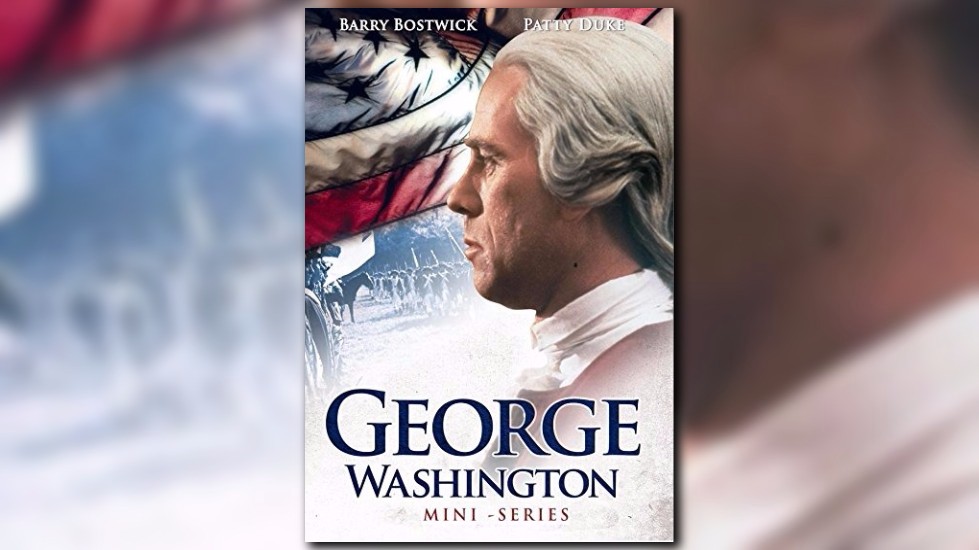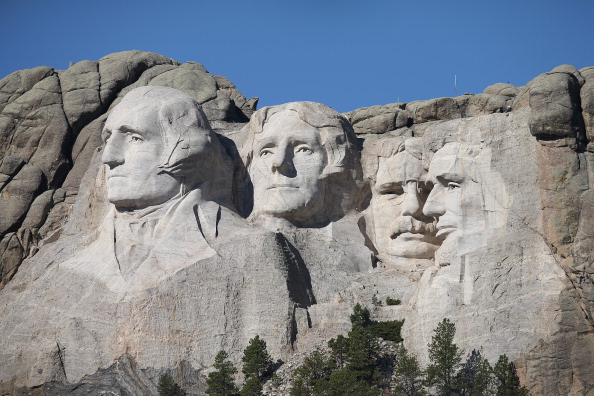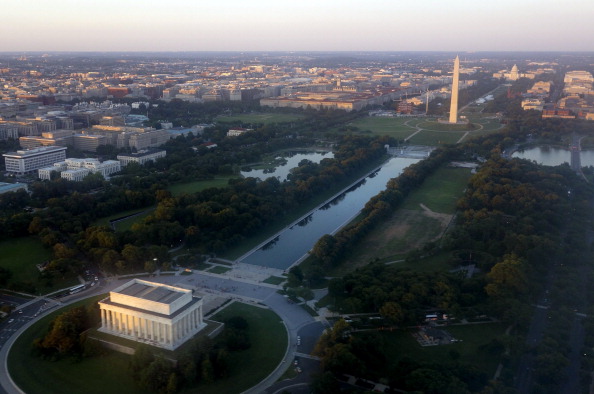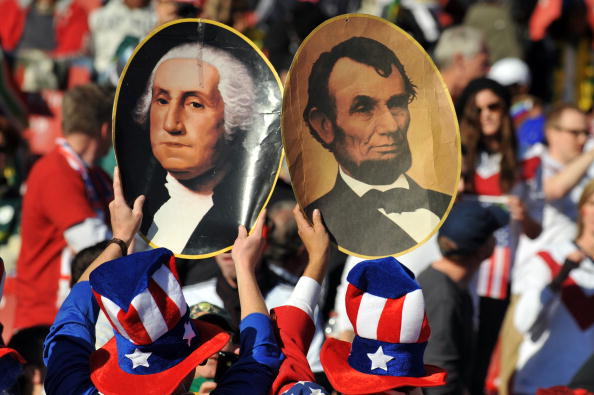Wednesday marks the birthday of George Washington, America's first president and the man who is often termed as the 'father of the country."
As Americans, we seem to be more nostalgic about our presidents than ever before. Recently, C-SPAN conducted a 'Presidential Historians Survey' to rank our nation's chief executives.
Abraham Lincoln placed first, followed by Washington, Franklin Delano Roosevelt, Theodore Roosevelt, and Dwight Eisenhower.
I didn't get a vote in this poll, sadly. But what if I had to choose between Washington and Lincoln? How do you come up with criteria to choose between G.W. and Honest Abe?
C-SPAN used items such as 'moral authority' and 'public persuasion' in their poll. I came up with my own way to dissect the tale of the tape. So without further adieu, here is my breakdown of George Washington vs. Abraham Lincoln:
1. Life Before Presidency
So what did you do before you took the oath of office? Some presidents were actors like Ronald Reagan, billionaires like Donald Trump, or peanut farmers like Jimmy Carter.
Let's look at the resumes of Washington and Lincoln.
Washington: Fought in the French and Indian War, served as a member of Virginia's House of Burgesses, was a delegate to the First and Second Continental Congresses, and also was President of the Constitutional Convention of 1787.
And oh by the way, he was Commander-in-Chief of the Continental Army during the Revolutionary War as he helped guide a ragtag collection of militias into the force that eventually defeated Great Britain.
Lincoln: Fought as a Captain in the Illinois militia in the Black Hawk War, was a representative in the Illinois House of Representatives, and the U.S. House of Representatives. He also was a respected lawyer in Springfield, and engaged Stephen Douglas in some of the most famous debates in political history during his bid for the U.S. Senate in 1858 (he would be defeated in that race)
The edge: George by a mile
2. Signature event in office
Some presidents, you can argue, had more than one landmark event during their administrations. F.D.R. had the Great Depression and World War II. Nixon inherited Vietnam, opened relations with Red China, and resigned in disgrace from Watergate. But let's look at Washington and Lincoln's terms and find that watershed moment.
Washington: His legacy isn't defined by an event, but by the precedents he set while in office. The cabinet, inaugural address, State of the Union, and most importantly, leaving office after two terms.
Lincoln: Of course, Lincoln dealt with the Civil War throughout his presidency. In 1862, he began to realize that the war was no longer about bringing back the old Union, but creating a new one. He decided the time had come to free the slaves who were being held captive in the South. On January 1, 1863, Lincoln's Emancipation Proclamation went into effect, declaring that "all persons held as slaves in the Confederate states will thenceforward, and forever, be free."
Lincoln later said of the Emancipation Proclamation, "I never, in my life, felt more certain that I was doing right, than I do in signing this paper."
The edge: Abe
3. Controversy or Scandal in office
We mentioned Mr. Nixon's resignation. Andrew Johnson and Bill Clinton both were impeached. Reagan had Iran-Contra, Lyndon Johnson put the nation fully into the Vietnam War, and John F. Kennedy dealt with the Bay of Pigs just over three months after taking the oath. How a President is able to withstand the black clouds that hang over his administration go a long way into defining his legacy. How did Lincoln and Washington do in hard times?
Washington: Much of his second term was spent trying to keep the young United States out of the conflict between France and Great Britain. Many Americans who remembered the patriotic spirit that helped shape the American Revolution, were on the side of France, in the midsts of its own revolution. Washington sent Chief Justice of the Supreme Court, John Jay, to Great Britain to negotiate a deal that would normalize trade relations, remove them from western forts (including on the Great Lakes), and resolve financial debts remaining from the Revolution.
Although the Jay Treaty improved U.S. and British relations for the next decade, it outraged the French and helped lead to the rise of the "Jeffersonian" faction of the Democratic-Republican Party. It would be the job of the next president, John Adams, to try to keep the nation out of war.
Lincoln: It is rumored that the President once tried to have an arrest warrant made out for Chief Justice Roger Taney in 1861. The man behind the majority opinion in the Dred Scott case saying, "blacks had no rights which the white man was bound to respect," came after President Lincoln for suspending the writ of habeus corpus.
But here's my biggest beef with Lincoln, he was LOUSY at picking generals to command the Union Army. This is the guy that put George McClellan at the head of the Army of the Potomac TWICE. My man had as many commanding generals in four years as the Browns have had quarterbacks since 1999. OK, I'm exaggerating, but you get the point. The Union had overwhelming advantage of strength in just about every battle, and just about every time between 1861-63, lost because of incompetence in leadership. Thank goodness for U.S. Grant.
The edge: This is tough...I'm going to call it a draw
4. Movie/TV references
Washington: Why oh why hasn't there been a theatrical movie made about the 'father of our country?' I'd see it! However, you can see G.W. in several miniseries and made-for-TV movies:
George Washington: The Miniseries was made in the mid-1980s starring Barry Bostwick as Washington. It's long, but very informative and entertaining.

The Crossing features my man Jeff Daniels as Washington as he prepares to lead the Continental Army across the Delaware for a Christmas attack on Trenton. Daniels is always great and excels in this role as well.
And the Tom Hanks-produced miniseries John Adams, features David Morse as Washington.
Lincoln: There are good performances of America's 16th President by actors like Hal Holbrook, Gregory Peck, and Sam Waterston. But Daniel Day-Lewis' portrayal in Steven Spielberg's 2012 film Lincoln is exceptional. He more than earned his third Academy Award for Best Actor in that role, which also features Sally Field and Tommy Lee Jones.
The thing that amazed me so much about the film Lincoln is that it focuses on a largely untold time in his presidency, the passing of the 13th Amendment to abolish slavery in early 1865. Do yourself a favor and watch the movie if you haven't seen it.
The edge: Daniel Day-Lewis and Abe for the win!
5. Honors/Monuments
Both of these icons are on Mount Rushmore.

Each one has a monument in their honor in our nation's capital:

But come on man, not only is Washington D.C. named for George Washington, he also has a state named after him.
And one of my favorite facts about George Washington is that he is our highest ranking military officer for all time: General of the Armies of the United States, which Congress bestowed on him in 1976.
The edge: Let George do it!
If you're scoring at home, it's two votes for each plus a draw. That's how close it is when you compare these two giants.
For performance in office as President, I definitely give the edge to Lincoln. In fact, I have F.D.R. second, then Washington in my top three.
But if you are talking about the most significant figure in American history, there is a reason why George Washington will always be, "First in war, first in peace, first in the hearts of his countrymen."
Happy Birthday, Mr. President!


